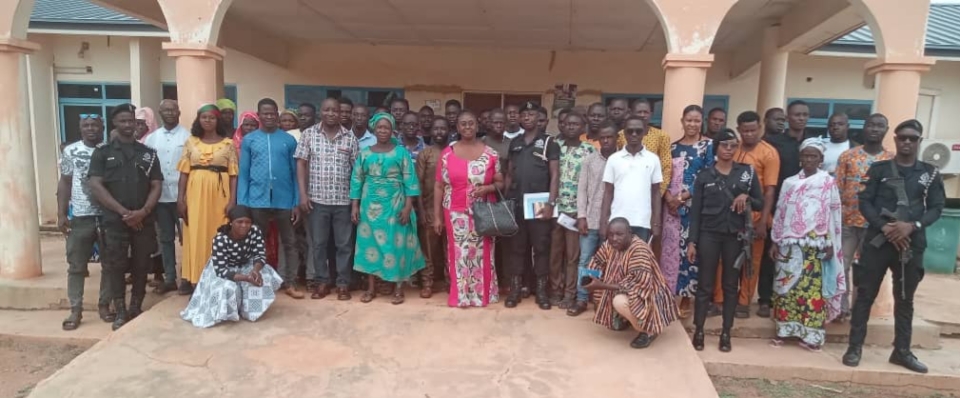The Director in charge of Capacity Development and Outreach at, the National Peace Council, Madam Janet Dedei Sarney-Kuma says conflicts are natural and inevitable phenomena in human interactions and society which have diverse impacts on development.
According to her, conflicts are necessary for positive change, growth, and transformation, however, such conflicts should not degenerate into violence and wars, leading to a negative impact including instability, and loss of lives and properties.
“Conflict is a natural thing because no matter what we do or where we are there will always be misunderstanding and conflict, but we do not have to allow such misunderstandings or conflicts degenerate into wars, violence or civil unrest among others,” she said.
Madam Sarney-Kuma was speaking to stakeholders at Garu in the Upper East Region during a training forum, organised by the National Peace Council as part of the “Enhancing Social Cohesion and Social Contract through Empowering Women and youth in Northern Ghana project”.
The project is being implemented in the Bongo, Bawku West, and Garu Districts, with funds from the United Nations Peacebuilding Fund through the United Nations Development Programme (UNDP) and the United Nations Population Fund (UNFPA).
The training brought together traditional and religious leaders, Assembly members, women and youth leaders, security services and other state institutions among others from selected communities.
It aimed to equip the stakeholders with conflict management and resolution skills, techniques to detect activities of violent extremism, and political vigilantism among others, to help resolve and prevent conflicts as well as build resilience of border and hotspots communities against violent extremism.
The stakeholders were also taken through the linkage between human rights, responsibilities, and conflicts and how the denial of one’s right could lead to violent conflict.
Madam Sarney-Kuma reiterated the commitment of the National Peace Council to building the resilience of communities to ensure respect for human rights and promote peaceful coexistence especially ahead of the 2024 general elections.
“We want to build confidence in communities to manage their disputes and conflicts better and we hope to do more training before the elections,” she added.
The Executive Secretary of Upper East Regional Peace Council, Mr Ali Anankpieng said community leaders needed to work together to manage, resolve and prevent localised conflicts and lead advocacy to strengthen social cohesion as part of efforts to prevent the spillover of activities of violent extremists.
He observed that unresolved conflicts such as chieftaincy, land and farmer-herder-related issues at the community level were fertile grounds for perpetrators of violence particularly violent extremists to exploit.
He stressed the need for community leaders such as family heads, traditional and religious leaders, opinion leaders and Assembly members among others to work in unison to resolve conflicts in their respective communities and enable them to live in peace.
“You need to be more vigilant about violent extremism and if you identify something suspicious, report it to the security services this year also being an election year, we expect you in the interest of the communities, to have one voice and demand for your rights from the political parties,” he said.
A Human Rights Officer, Mr Edmond Alagpulinsa who facilitated the training noted that ensuring peace and stability required the responsibility of all stakeholders and advised the communities to be tolerant and avoid discrimination to live in peace.
Latest Stories
-
Thomas Partey crowned 2025 Ghana Footballer of the Year
19 minutes -
IGP orders major raids on illegal mining sites along River Ankobra: 61 arrested
26 minutes -
Iran missiles cause multiple casualties in Israel as Israeli strikes hit Tehran oil depot
33 minutes -
Parliament lauds nurses and midwives for calling off strike
1 hour -
12 out of 14 districts suffering from illegal mining – Western Regional Minister
1 hour -
Ghana ready for assembling combustion vehicles, production of electric vehicles – Energy Ministry
1 hour -
Don’t buy contaminated food – Environmental director advises
1 hour -
Ghana exposed to global fuel shocks amid empty oil buffers – COPEC
1 hour -
Energy Ministry says suspension of fuel levy due to Iran-Israel tensions, soaring oil prices
2 hours -
Mahama commends Yaa Naa for peace in Dagbon
2 hours -
Father’s Day: Husbands must adapt to changing roles – Ebo Whyte
2 hours -
Ghana validates first National E-Commerce Strategy
2 hours -
Did Israel-Iran tensions prompt Ghana to rethink GH¢1 Fuel Levy implementation?
3 hours -
MP for Weija-Gbawe demands immediate completion of storm drain to end flood nightmare
4 hours -
Fuel tax U-turn reveals ‘trial-and-error governance’ – Minority
5 hours

